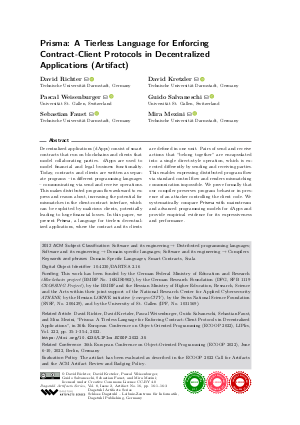Prisma: A Tierless Language for Enforcing Contract-Client Protocols in Decentralized Applications (Artifact)
Authors
David Richter  ,
David Kretzler
,
David Kretzler  ,
Pascal Weisenburger
,
Pascal Weisenburger  ,
Guido Salvaneschi
,
Guido Salvaneschi  ,
Sebastian Faust
,
Sebastian Faust  ,
Mira Mezini
,
Mira Mezini 
-
Part of:
Issue:
Special Issue of the 36th European Conference on Object-Oriented Programming (ECOOP 2022)
Part of: Volume: DARTS, Volume 8 (ECOOP 2022)
Part of: Conference: European Conference on Object-Oriented Programming (ECOOP)
Part of: Journal: Dagstuhl Artifacts Series (DARTS) - License:
 Creative Commons Attribution 4.0 International license
Creative Commons Attribution 4.0 International license
- Publication Date: 2022-06-23
Artifact Description

PDF
DARTS.8.2.16.pdf
- Filesize: 0.51 MB
- 3 pages
Document Identifiers
Subject Classification
ACM Subject Classification
- Software and its engineering → Distributed programming languages
- Software and its engineering → Domain specific languages
- Software and its engineering → Compilers
Keywords
- Domain Specific Languages
- Smart Contracts
- Scala
Metrics
- Access Statistics
-
Total Accesses (updated on a weekly basis)
0Document
0Metadata
Artifact
DARTS-8-2-16-artifact-0c6f90c19e776ae9232aa44f03e598d9.zip
(Filesize: 0.78 GB)
MD5 Sum:
0c6f90c19e776ae9232aa44f03e598d9
(Get MD5 Sum)
Artifact Evaluation Policy
The artifact has been evaluated as described in the ECOOP 2022 Call for Artifacts and the ACM Artifact Review and Badging Policy
Abstract
Decentralized applications (dApps) consist of smart contracts that run on blockchains and clients that model collaborating parties. dApps are used to model financial and legal business functionality. Today, contracts and clients are written as separate programs - in different programming languages - communicating via send and receive operations. This makes distributed program flow awkward to express and reason about, increasing the potential for mismatches in the client-contract interface, which can be exploited by malicious clients, potentially leading to huge financial losses. In this paper, we present Prisma, a language for tierless decentralized applications, where the contract and its clients are defined in one unit. Pairs of send and receive actions that “belong together” are encapsulated into a single direct-style operation, which is executed differently by sending and receiving parties. This enables expressing distributed program flow via standard control flow and renders mismatching communication impossible. We prove formally that our compiler preserves program behavior in presence of an attacker controlling the client code. We systematically compare Prisma with mainstream and advanced programming models for dApps and provide empirical evidence for its expressiveness and performance.
Cite As Get BibTex
David Richter, David Kretzler, Pascal Weisenburger, Guido Salvaneschi, Sebastian Faust, and Mira Mezini. Prisma: A Tierless Language for Enforcing Contract-Client Protocols in Decentralized Applications (Artifact). In Special Issue of the 36th European Conference on Object-Oriented Programming (ECOOP 2022). Dagstuhl Artifacts Series (DARTS), Volume 8, Issue 2, pp. 16:1-16:3, Schloss Dagstuhl – Leibniz-Zentrum für Informatik (2022)
https://doi.org/10.4230/DARTS.8.2.16
BibTex
@Article{richter_et_al:DARTS.8.2.16,
author = {Richter, David and Kretzler, David and Weisenburger, Pascal and Salvaneschi, Guido and Faust, Sebastian and Mezini, Mira},
title = {{Prisma: A Tierless Language for Enforcing Contract-Client Protocols in Decentralized Applications (Artifact)}},
pages = {16:1--16:3},
journal = {Dagstuhl Artifacts Series},
ISSN = {2509-8195},
year = {2022},
volume = {8},
number = {2},
editor = {Richter, David and Kretzler, David and Weisenburger, Pascal and Salvaneschi, Guido and Faust, Sebastian and Mezini, Mira},
publisher = {Schloss Dagstuhl -- Leibniz-Zentrum f{\"u}r Informatik},
address = {Dagstuhl, Germany},
URL = {https://drops.dagstuhl.de/entities/document/10.4230/DARTS.8.2.16},
URN = {urn:nbn:de:0030-drops-162149},
doi = {10.4230/DARTS.8.2.16},
annote = {Keywords: Domain Specific Languages, Smart Contracts, Scala}
}
Author Details
Funding
This work has been funded by the German Federal Ministry of Education and Research iBlockchain project (BMBF No. 16KIS0902), by the German Research Foundation (DFG, SFB 1119 CROSSING Project), by the BMBF and the Hessian Ministry of Higher Education, Research, Science and the Arts within their joint support of the National Research Center for Applied Cybersecurity ATHENE, by the Hessian LOEWE initiative (emergenCITY), by the Swiss National Science Foundation (SNSF, No. 200429), and by the University of St. Gallen (IPF, No. 1031569).
Related Article
- David Richter, David Kretzler, Pascal Weisenburger, Guido Salvaneschi, Sebastian Faust, and Mira Mezini, "Prisma: A Tierless Language for Enforcing Contract-Client Protocols in Decentralized Applications", in 36th European Conference on Object-Oriented Programming (ECOOP 2022), LIPIcs, Vol. 222, pp. 35:1-35:4, 2022. https://doi.org/10.4230/LIPIcs.ECOOP.2022.35
